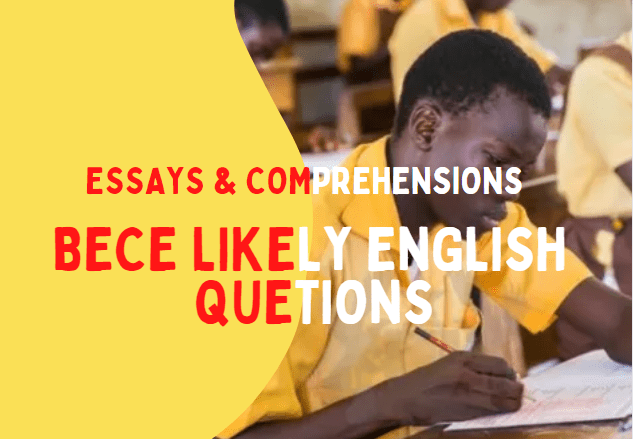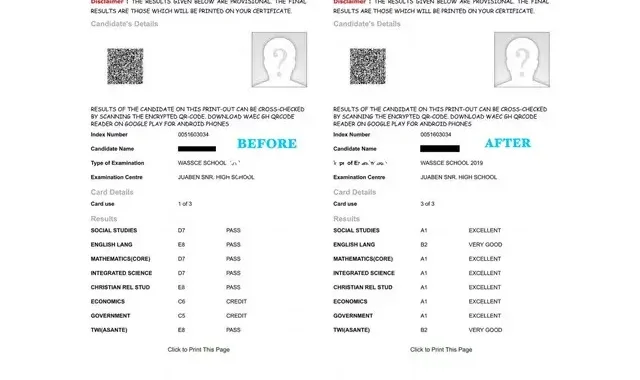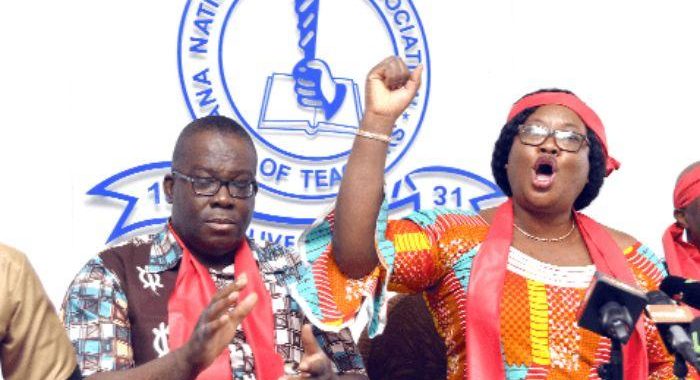2023 BECE Predicted English Language Essay Areas

As candidates get ready for the 2023 BECE English Language paper, it is important that they take careful consideration of the following Essay type questions and work towards them.
In preparing for these essays, it is recommended that candidates pay close attention to the following.
a. Mastering the features of the various types of essays (By the features, we mean the organization of the essay type).
c. Candidates must learn how to brainstorm and plan their essays before they start writing.
The new trend is that WAEC set questions that will require candidates to describe in a letter or narrate in a letter be it a formal or informal letter.
2023 BECE Predicted English Language Essay Areas
The areas projected are in three categories. Most Likely, More Likely, and Likely
Most Likely
- Formal letters: Letters to persons in high positions eg. Members of Parliament, Owners of Companies, and Philanthropists. This also includes a letter to the editor or a new paper or magazine.
- Narrative essays – WAEC enjoys asking candidates to write essays by providing candidates with the required ending.
More Likely
Debate and Friendly Letter questions to your brother or Sister etc
Article for publication on for instance a social issue
Less Likely
Descriptive essays
Features of Formal Letters for a BECE Candidate
Formal letters are an important form of written communication that BECE candidates should be familiar with. Here are the key features of formal letters that candidates should know:
- Sender’s Address: The sender’s address is typically placed at the top-right corner of the letter. It includes the candidate’s name, home address, city, and postal code.
- Date: The date is written below the sender’s address on the right-hand side of the letter. It is important to include the complete date, including the day, month, and year. Eg. 5th July 2020.
- Receiver’s Address: The receiver’s address is placed below the date on the left-hand side of the letter. It includes the name of the recipient, their designation or position, the name of the organization or institution, the address, and the city.
- Formal Salutation: Begin the letter with a formal salutation such as “Dear Sir” or “Dear Madam.” If you know the name of the recipient, it is more appropriate to address them by their name, such as “Dear Mr. Smith” or “Dear Dr. Johnson.”
- Title of the letter in capital letters which must be centred and underlined neatly.
- Introduction: Start the letter with a formal introduction that states the purpose of the letter and provides any necessary background information. Clearly and concisely introduce yourself and the reason for writing.
- Body Paragraphs: The body of the formal letter contains the main content and information. It is divided into paragraphs, each addressing a specific point or topic. Use clear and concise language to communicate your message effectively.
- Formal Tone: Formal letters should maintain a professional and polite tone throughout. Avoid using informal or colloquial language and maintain a respectful and courteous approach.
- Proper Language and Grammar: Use correct grammar, punctuation, and spelling in your formal letter. It is essential to proofread the letter for any errors before sending it.
- Formal Closing: End the letter with a formal closing phrase, such as “Yours faithfully” or “Yours sincerely.” Use “Yours faithfully” when you do not know the name of the recipient and “Yours sincerely” when you address the recipient by name.
- Signature and Name: After the closing phrase, leave a space to handwrite your signature. Below your signature, type your full name, which should match the sender’s name mentioned at the beginning of the letter.
Remember to follow the appropriate formatting and conventions for formal letters. Pay attention to details such as spacing, alignment, and proper placement of addresses and dates. Following these features will help BECE candidates write effective and professional formal letters.
READ: WASSCE 2023 English Language Essay and Comprehension Questions For Revision
2. Argumentative Essays:
Here are five argumentative essay questions that BECE candidates can consider:
- Should students be required to wear school uniforms? Argue for or against the implementation of school uniforms, considering factors such as discipline, equality, and self-expression.
- Is social media beneficial or harmful to teenagers? Present arguments for the positive and negative impacts of social media on teenagers.
- Should junk food be banned in schools? Discuss the implications of allowing or prohibiting junk food in school cafeterias, focusing on the effects on students’ health, academic performance, and lifestyle choices.
- Should mobile phones be allowed in classrooms? Argue for or against the use of mobile phones by students in educational settings, considering their potential benefits and drawbacks on learning, distraction, and communication.
- Is homework necessary for students’ academic success? Present arguments supporting or opposing the practice of assigning homework, taking into account its impact on students’ learning, time management, and overall well-being.
These essay questions provide BECE candidates with a variety of topics to choose from, allowing them to express their opinions, develop critical thinking skills, and support their arguments with evidence and logical reasoning.
For or Against the motion questions. Candidates must know the features very well.
Speech
- Clear Title Written Capital Letters And Centred
- Introduction: The introduction section of an argumentative essay provides background information on the topic and presents the thesis statement. It should capture the reader’s attention and provide context for the argument. Use the right vocative
- A strong argumentative essay acknowledges counterarguments or opposing viewpoints. BECE candidates should anticipate opposing viewpoints and address them in their essays. They should provide a counterargument and then refute it with logical reasoning and evidence.
- Logical Organization: Argumentative essays should have a clear and logical structure. Candidates should use paragraphs to present different points and support them with evidence. Each paragraph should focus on a single idea and smoothly transition to the next.
- Persuasive Language: The use of persuasive language is crucial in an argumentative essay. BECE candidates should use strong and compelling language to convince the reader of their viewpoint.
- Coherence and Cohesion: A well-written argumentative essay should be coherent and cohesive. BECE candidates should use appropriate transition words and phrases to ensure a smooth flow between paragraphs and ideas. The essay should have a logical progression from the introduction to the conclusion.
- Balanced Presentation: While presenting arguments, BECE candidates should strive for balance. They should provide sufficient evidence for their claims while considering and addressing opposing viewpoints. A balanced approach demonstrates critical thinking and a nuanced understanding of the topic.
- Conclusion: The conclusion of an argumentative essay summarizes the main points and restates the thesis statement. It should leave a lasting impression on the reader and reinforce the strength of the argument.
- Editing and Proofreading: BECE candidates should allocate time for editing and proofreading their essays. They should check for grammatical errors, clarity of expression, and coherence. Careful editing ensures that the essay is well-polished and effectively communicates the argument.
3. Speech Writing
Here are five speech essay questions that BECE candidates can consider:
- Write a Speech on “How students can contribute to creating a clean environment”
- Write a speech to be delivered at a community durbar on “The significance of community service (Communal Labour) and how it can benefit both individuals and communities.
- Write a Speech to be delivered at your school’s graduation on “Challenges JHS 3 candidates face when preparing for the BECE.
- Write a Speech to be read at the inauguration of your School’s ICT lab on the theme “The impact of technology on society” Tips for this question: Talk about the positive and negative effects of technology on society, including areas such as communication, education, and employment
- Write a speech to be delivered at the Human Rights Programme on “Types and Dangers of abuse suffered by girls in our society”
- Write a Speech you will deliver at the upcoming youth summit on the theme “Dangers of Boy-Girl Relationships”
These speech essay questions offer BECE candidates the opportunity to express their ideas, raise awareness on important topics, and engage the audience through persuasive communication. It’s essential for candidates to conduct research, gather relevant information, and structure their speeches effectively to deliver impactful presentations.
READ: June 2023 BECE Super Mock 2 Examiners’ Report
More Likely
Debate and Friendly Letter questions
Likely
Article for publication
Narrative essays
Descriptive essays
We have no doubt that this post : Predicted 2023 BECE English Language Essay Areas” will help candidates put the finishing touches to their preparation.
Send Stories | Social Media | Disclaimer
Send Stories and Articles for publication to [email protected]
We Are Active On Social Media
WhatsApp Channel: JOIN HERE
2024 BECE and WASSCE Channel - JOIN HERE
Facebook: JOIN HERE
Telegram: JOIN HERE
Twitter: FOLLOW US HERE
Instagram: FOLLOW US HERE
Disclaimer:
The information contained in this post on Ghana Education News is for general information purposes only. While we endeavour to keep the information up to date and correct, we make no representations or warranties of any kind, express or implied, about the completeness, accuracy, reliability, suitability or availability with respect to the website or the information, products, services, or related graphics contained on the post for any purpose.



 WASSCE Results Upgrading: Total Scam Or Something Worth Your Money?
WASSCE Results Upgrading: Total Scam Or Something Worth Your Money?  Teacher Unions Start Regional Demo With Volta Region On May 3rd
Teacher Unions Start Regional Demo With Volta Region On May 3rd  How to buy UG Admission Voucher with Momo/Shortcode
How to buy UG Admission Voucher with Momo/Shortcode  Update: No new uniforms or mass school repainting planned – MoE
Update: No new uniforms or mass school repainting planned – MoE  Why Nkrumah’s Face appeared on Guinea’s currency
Why Nkrumah’s Face appeared on Guinea’s currency  Controversies surrounding Ghana’s new public school uniform initiative
Controversies surrounding Ghana’s new public school uniform initiative